Moogfest
This is either a story of poorly-managed expectations, or of me being an idiot, depending on how generous you’re feeling.
Eight months ago, when I heard that Moogfest was coming to Durham, I jumped on the chance to get tickets. I like electronic music, and I’ve always been fascinated by sound and signals and even signal processing mathematics. At the time, I was taking an online course in Digital Signal Processing for Music Applications. I recruited a wingman; my friend Jeremy is also into making noise using open source software.
The festival would take place over a four-day weekend in May, so I signed up for two vacation days and I cleared the calendar for four days of music and tech geekery. Since I am not much of a night-owl, I wanted to get my fill of the festival in the daytime and then return home at night… one benefit of being local to Durham.
Pretty soon, the emails started coming in… about one a week, usually about some band or another playing in Durham, with one or two being way off base, about some music-related parties on the west coast. So I started filing these emails in a folder called “moogfest”. Buried in the middle of that pile would be one email that was important… although I had purchased a ticket, I’d need to register for workshops that had limited attendance.
Unfortunately, I didn’t do any homework in advance of Moogfest. You know, life happens. After all, I’d have four days to deal with the festival. So Jeremy and I showed up at the American Tobacco campus on Thursday with a clean slate… dumb and dumber.
Thursday
Thursday started with drizzly rain to set the mood.
I’m not super familiar with Durham, but I know my way around the American Tobacco campus, so that’s where we started. We got our wristbands, visited the Modular Marketplace (a very small and crowded vendor area where they showed off modular synthesizer blocks) and the Moog Pop-up Factory (one part factory assembly area, and one part Guitar Center store). Thankfully, both of these areas made heavy use of headphones to keep the cacophony down.
From there, we ventured north, outside of my familiarity. The provided map was too small to really make any sense of — mainly because they tried to show the main festival area and the outlying concert area on the same map. So we spent a lot of time wandering, trying to figure out what we were supposed to see. We got lost and stopped for a milkshake and a map-reading. Finally, we found the 21c hotel and museum. There were three classrooms inside the building that housed workshops and talks, but that was not very clearly indicated anywhere. At every turn, it felt like we were in the “wrong place“.
We finally found a talk on “IBM Watson: Cognitive Tech for Developers“. This was one of the workshops that required pre-registration, but there seemed to be room left over from no-shows, so they let us in. This ended up being a marketing pitch for IBM’s research projects — nothing to do with music synthesis or really even with IBM’s core business.
Being unfamiliar with Durham, and since several points on the map seemed to land in a large construction area, we wandered back to the American Tobacco campus for a talk. We arrived just after the talk started, so the doors were closed. So we looked for lunch. There were a few sit-down restaurants, but not much in terms of quick meals (on Friday, I discovered the food trucks).
Finally, we declared Thursday to be a bust, and we headed home.
We’d basically just spent $200 and a vacation day to attend three advertising sessions. I seriously considered just going back to work on Friday.
With hopes of salvaging Friday, I spent three hours that night poring over the schedule to figure out how it’s supposed to be done.
- I looked up all of the venues, noting that several were much farther north than we had wandered.
- I registered (wait-listed) for workshops that might be interesting.
- I tried to visualize the entire day on a single grid, gave up on that, and found I could filter the list.
- I read the descriptions of every event and put a ranking on my schedule.
- I learned – much to my disappointment – that the schedule was clearly divided at supper time, with talks and workshops in the daytime and music at night.
- I made a specific plan for Friday, which included sleeping in later and staying later in the night to hear some music.
Friday
I flew solo on Friday, starting off with some static displays and exploring the venues along West Morgan Street (the northern area). Then I attended a talk on “Techno-Shamanism“, a topic that looked interesting because it was so far out of my experience. The speaker was impressively expressive, but it was hard to tell whether he was sharing deep philosophical secrets or just babbling eloquently… I am still undecided.
I rushed off to the Carolina Theater for a live recording of the podcast “Song Exploder“. However, the theater filled just as I arrived — I mean literally, the people in front of me were seated — and the rest of the line was sent away. Severe bummer.
I spent a lot of time at a static display called the Wifi Whisperer, something that looked pretty dull from the description in the schedule, but that was actually pretty intriguing. It showed how our phones volunteer information about previous wifi spots we have attached to. My question – why would my phone share with the Moogfest network the name of the wifi from the beach house we stayed at last summer? Sure enough, it was there on the board!
Determined to not miss any more events, I rushed back to ATC for a talk on Polyrhythmic Loops, where the speaker demonstrated how modular synth clocks can be used to construct complex rhythms by sending sequences of triggers to sampler playback modules. I kind of wish we could’ve seen some of the wire-connecting madness involved, but instead he did a pretty good job of describing what he was doing and then he played the results. It was interesting, but unnecessarily loud.
The daytime talks were winding down, and my last one was about Kickstarter-funded music projects.
To fill the gap until the music started, I went to “Tech Jobs Under the Big Top“, a job fair that is held periodically in RTP. As if to underscore the craziness of “having a ticket but still needing another registration” that plagued Moogfest, the Big Top folks required two different types of registration that kept me occupied for much longer than the time I actually spent inside their tent. Note: the Big Top event was not part of Moogfest, but they were clearly capitalizing on the location, and they were even listed in the Moogfest schedule.
Up until this point, I had still not heard any MUSIC.
My wingman returned and we popped into our first music act, Sam Aaron played a “Live Coding” set on his Sonic Pi. This performance finally brought Moogfest back into the black, justifying the ticket price and the hassles of the earlier schedule. His set was unbelievable, dropping beats from the command line like a Linux geek.
To wrap up the night, we hiked a half mile to the MotorCo stage to see Grimes, one of the headline attractions of Moogfest. Admittedly, I am not part of the target audience for this show, since I had never actually heard of Grimes, and I am about 20 years older than many of the attendees. But I had been briefly introduced to her sound at one of the static displays, so I was stoked for a good show. However, the performance itself was really more of a military theatrical production than a concert.
Sure, there was a performer somewhere on that tiny stage in the distance, but any potential talent there was hidden behind explosions of LEDs and lasers, backed by a few kilotons of speaker blasts.
When the bombs stopped for a moment, the small amount of interstitial audience engagement reminded me of a middle school pep rally, both in tone and in body language. The words were mostly indiscernible, but the message was clear. Strap in, because this rocket is about to blast off! We left after a few songs.
Saturday
Feeling that I had overstayed my leave from home, I planned a light docket for Saturday. There were only two talks that I wanted to see, both in the afternoon. I could be persuaded to see some more evening shows, but at that point, I could take them or leave them.
Some folks from Virginia Tech gave a workshop on the “Linux Laptop Orchestra” (titled “Designing Synthesizers with Pd-L2Ork“). From my brief pre-study, it looked like a mathematical tool used to design filters and create synthesizers. Instead, it turned out to be an automation tool similar to PLC ladder logic that could be used to trigger the playback of samples in specific patterns. This seemed like the laptop equivalent to the earlier talk on Polyrhythmic Loops done with synth modules. The talk was more focused on the wide array of toys (raspi, wii remotes) that could be connected to this ecosystem, and less about music. Overall, it looked like a very cool system, but not enough to justify a whole lot of tinkering to get it to run on my laptop (for some reason, my Ubuntu 15.10 and 16.04 systems both rejected the .deb packages because of package dependencies — perhaps this would be a good candidate for a docker container).
The final session of Moogfest (for me, at least) was the workshop behind Sam Aaron’s Friday night performance. Titled “Synthesize Sounds with Live Code in Sonic Pi“, he explained in 90 minutes how to write Ruby code in Sonic Pi, how to sequence samples and synth sounds, occasionally diving deep into computer science topics like the benefits of pseudo-randomness and concurrency in programs. Sam is a smart fellow and a natural teacher, and he has developed a system that is both approachable by school kids and sophisticated enough for post-graduate adults.
Wrap Up
I skipped Sunday… I’d had enough.
My wife asked me if I would attend again next year, and I’m undecided (they DID announce 2017 dates today). I am thrilled that Moogfest has decided to give Durham a try. But for me personally, the experience was an impedance mismatch. I think a few adjustments, both on my part and on the part of the organizers, would make the festival lot more attractive. Here is a list of suggestions that could help.
- Clearly, I should’ve done my homework. I should have read through each and every one of the 58 emails I received from them, possibly as I received them, rather than stockpiling them up for later. I should have tuned in more closely a few weeks in advance of the date for some advanced planning as the schedule materialized.
- Moogfest could have been less prolific with their emails, and clearly labeled the ones that required some action on my part.
- The organizers could schedule music events throughout the day instead of just during the night shift… I compare this festival with the IBMA Wide Open Bluegrass festival in Raleigh, which has music throughout the day and into the nights. Is there a particular reason why electronic music has to be played at night?
- I would enjoy a wider variety of smaller, more intimate performances, rather than megawatt-sized blockbuster performances. At least one performance at the Armory was loud enough to send me out of the venue, even though I had earplugs. It was awful.
- The festival could be held in a tighter geographic area. The American Tobacco Campus ended up being an outlier, with most of the action being between West Morgan Street and West Main Street (I felt like ATC was only included so Durham could showcase it for visitors). Having the events nearer to one another would mean less walking to-and-from events (I walked 14½ miles over the three days I attended). Shuttle buses could be provided for the severely outlying venues like MotorCo.
- The printed schedule could give a short description of the sessions, because the titles alone did not mean much. Static displays (red) should not be listed on the schedule as if they are timed events.
- The web site did a pretty good job of slicing and dicing the schedule, but I would like to be able to vote items up and down, then filter by my votes (don’t show me anything I have already thumbs-downed). I would also like to be able to turn on and off entire categories – for example, do not show me the (red) static events, but show all (orange) talks and (grey) workshops.
- The register-for-workshops process was clearly broken. As a late-registerer, my name was not on anyone’s printed list. But there was often room anyway, because there’s no reason for anyone to ever un-register for a workshop they later decided to skip.
- The time slots did not offer any time to get to and from venues. Maybe they should be staggered (northern-most events start on the hour, southern-most start on the half-hour) to give time for walking between them.
All in all, I had a good time. But I feel like I burned two vacation days (and some family karma/capital) to attend a couple of good workshops and several commercial displays. I think I would have been equally as happy to attend just on Saturday and Sunday, if the music and talks were intermixed throughout the day, and did not require me to stick around until 2am.
One comment
Leave a Reply
You must be logged in to post a comment.
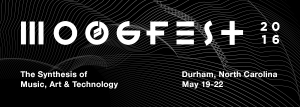
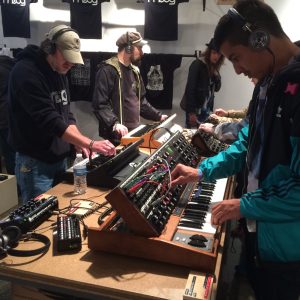
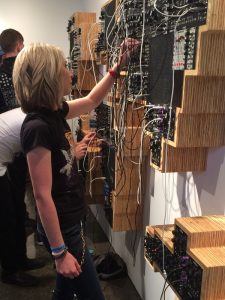
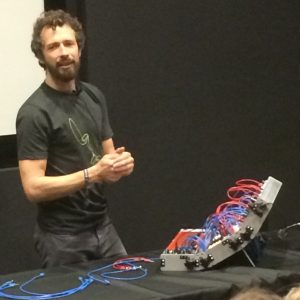
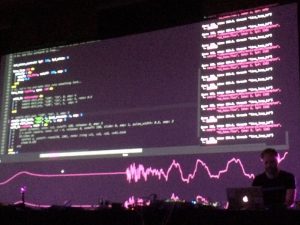
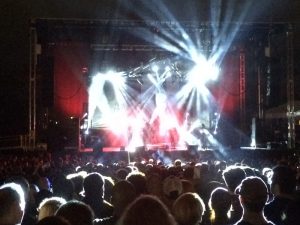
Hi Alan,
as I am also playing with Sonic Pi, I picked up you blog post from Sam’s twitter message. Thanks a lot. I do not see me attending the Mood festival ever (but who knows) but I always appreciate authentic reports from visitors and it was a entertaining read! Also I definitely support you wish for more music during day time (I might be able to visit the Loop at Berlin in November) because I am also not a night owl.
Best
Martin